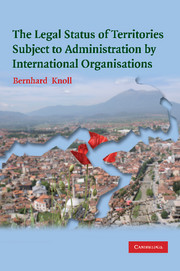Book contents
- Frontmatter
- Contents
- Illustrations
- Foreword: Pierre-Marie Dupuy
- Acknowledgements
- Table of Cases and Judicial Decisions
- List of Abbreviations
- Introduction
- 1 Creation of internationalised territories
- 2 Fiduciary administration: mandates, trust and the transitory sovereignty vacuum
- 3 Self-determination and the personality of internationalised territories
- 4 ‘The King's two bodies’: the dual functions of international administrations
- 5 Extent of UN authority in Kosovo and the problem of an open-ended institution-building mandate
- 6 The status process: Kosovo's endgame
- 7 An anomalous legitimacy cycle
- 8 Properties of a transitory legal order
- Concluding appraisal
- Bibliography
- Index
6 - The status process: Kosovo's endgame
Published online by Cambridge University Press: 11 August 2009
- Frontmatter
- Contents
- Illustrations
- Foreword: Pierre-Marie Dupuy
- Acknowledgements
- Table of Cases and Judicial Decisions
- List of Abbreviations
- Introduction
- 1 Creation of internationalised territories
- 2 Fiduciary administration: mandates, trust and the transitory sovereignty vacuum
- 3 Self-determination and the personality of internationalised territories
- 4 ‘The King's two bodies’: the dual functions of international administrations
- 5 Extent of UN authority in Kosovo and the problem of an open-ended institution-building mandate
- 6 The status process: Kosovo's endgame
- 7 An anomalous legitimacy cycle
- 8 Properties of a transitory legal order
- Concluding appraisal
- Bibliography
- Index
Summary
The advantages of recognition taking place by some collective international act, or through the medium of an international institution cannot be denied. It would obviate the present embarrassments due to unilateral acts of recognition.
Having examined a governance sphere that plagued UNMIK throughout its institution-building mission, we drew attention to the key actor in an internationalised territory and disaggregated the influences that converge around this bicephalous body in its agency and organic functions. UNMIK, it can be said, faced simultaneously ‘outward’ to the international community as a territorial agent, and ‘inward’ to a domestic audience as an international organ to perform the fiduciary bond. In its quality as situated territorial agent, an international mission is constrained in its articulation by the operation of a fiduciary bond between it and the governees. In its corollary identity as subsidiary organ of the UN its mission was constrained in its ‘domestic’ strategic choices by international law and the politics of its mother organisation. We held both aspects important to capture the nature of an international administration.
Notwithstanding the deep modernist grounding of the concept of the civilising mission, the ‘standards before status’ approach, so closely fashioned after policies of conditionality and the idea of ‘earned sovereignty’, operated in naïve denial of the continued relevance of selfreliant statehood. Serbia's assertion of sovereign rights over the territory thus hovered perpetually in the background of Kosovo politics, menacing to some, beguiling to others.
- Type
- Chapter
- Information
- The Legal Status of Territories Subject to Administration by International Organisations , pp. 248 - 287Publisher: Cambridge University PressPrint publication year: 2008



